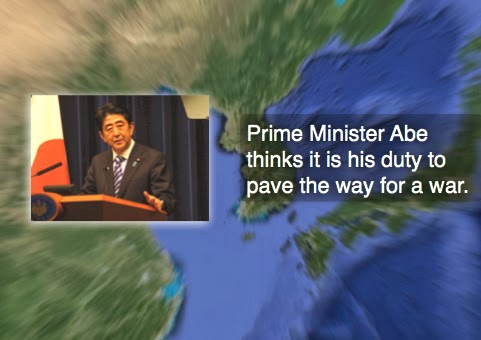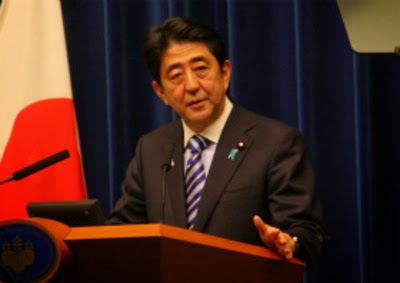image: J-CAST, google
“Are Japan and China on the eve of war?”
Prime Minister Abe’s remarks give a shock to Western media
- What matters in the Tokyo gubernatorial election? -
Japanese major mass media have covered nothing about Prime Minister Abe’s controversial remarks at a meeting in Davos. As shown in the second article, Prime Minister Abe gave away his true feeling. He made it known at home and abroad that he is steadily preparing to wage a war. Of course, the Bush/Nazi camp, neoconservatives who are looking forward to a war between Japan and China are pulling strings from behind the prime minister.
As I have mentioned so far, I suppose Prime
Minister Abe thinks it is his duty to pave the way for a war.
His real intention would be more easily
understood if we think that he gave this remark against the backdrop of a move
in which the next prime minister, who is probably Ishiba, will actually wage a
war instead of Abe, who has health problem.
While the Tokyo gubernatorial election has
been discussed in terms of various points of issue, we will have a war unless
the Abe administration is toppled. I
think that people who raise the issues of employment and children on waiting
list as points at issue lack an ability to read the trend of times. I may as well tell you what is important now
is to eliminated the Abe administration, which is too dangerous, as soon as
possible. The only possibility to
enables such elimination is the Tokyo gubernatorial election.
Masatoshi
Takeshita
January
25, 2014
………………..
English translation of an excerpt from a
Japanese article: J-cast – January 24, 2014 –
“Are
Japan and China on the eve of war?”
Prime Minister Abe’s remarks give a shock to Western media
On January 22, 2014, Prime Minster Abe, who
attended the World Economy Forum Annual Meeting (Davos Forum)
held in Switzerland, had a get-together by
inviting overseas media. His remarks on
explanation of the relationship with China at the meeting surprised the press.
A reporter of the British
Financial Times (FT) writes at the beginning of an
article dated January 22: “I asked Prime Minister Abe
if there is a possibility of war between Japan and China. Interestingly,
he didn’t rule out a possibility that such a military clash will occur.”
Additionally, according to him, Prime
Minister compared the current tension between Japan and
China to the rivalry between Britain and Germany before the First World War and
said there was a similar situation.
Although Britain had strong economic ties with Germany at that time,
just like between the current Japan and China, this had not prevented tensions
leading to a military clash in 1914.
Prime Minister Abe gave an explanation by comparing Britain/Germany to
Japan/China based on the fact.
The reporter commented that “The comments were made by a Japanese leader, not a
commentator. It gave all the more great shock to us.”
The article continues. Since Japan and China are trade partners who
produce mutual benefit, which is the same as the relations between Britain and
Germany at that time, peace serves as a breakwater to make the two countries
and neighboring countries prosper.
However, it is apparent that Prime Minister considered it provocative
for China to increase its defense budget by 10 percent a year.
Western media got indignant at Abe’s
remarks, which alluded to a possibility, they interpreted, that a “nightmare”
of 100 years ago would resurge between Japan and China.
The electronic
version of the New York Times dated January 22 gave a provocative headline: “Will
Japan and China walk the path to war?”
It cited the words of the prime minister saying “It is possible that incidental
clash or friction might unexpectedly occur.”
He has no policy to ease tensions between the
two big countries in Asia. He continued
to say: “Regrettably, we have no explicit road map for
problem solution.” On the other
hand, the prime minister reportedly said that the establishment of contact
system between the defense authorities of the two countries might result in
breaking the deadlock.
Chief Cabinet Secretary
Suga explained at a press conference on January 23 that
the real intention of Prime Minister Abe’s remarks is not to deteriorate the
Japan-China relations as those of Britain and Germany leading to the World War
I. The two countries, though having
economic ties, went to war 100 years ago.
We should never make the same mistake again. He emphasized that in case of some problem
between Japan and China, it is important to make a close mutual communication. Additionally, he said that Japan has a policy
to explain the prime minister’s intention to overseas media.
--------------------
English translation of an excerpt from a
Japanese article: Sakurai Journal – January 24, 2014 –
Prime
Minister Compares Japan-China Relations to Britain-Germany of World War I at
Davos Meeting with Disparity between Rich and Poor as Topic
“Global leaders,” who are criticized as
eroding democracy by NGO Oxfam, got together in Switzerland to have a
meeting. This is called “Davos meeting.”
At a press meeting, Prime Minister Abe, a participant at the meeting, gave insensitive remarks of comparing the Japan-China relations to those of Britain and Germany before the World War I, which has caused controversy.
When he was asked by Financial Times’
Gideon Rahman about the possibility of outbreak of war between Japan and China,
he did not rule it out and cited the Britain and
Germany before the World War I.
Needless to say, the
first speech of response is important because it is most likely to reveal the
true nature of a speaker. It,
therefore, was natural for foreign media to pay attention to it. The problem is not the phrase of “similarity,”
but the citation of Britain and Germany before the World War I.
Obviously, Rachman asked
about a possibility of war between Japan and China, only
because Prime Minister Abe has continued his belligerent behavior, as pointed out by Professor Ezra Vogel of Harvard University. The prime nimister clearly claims the revision
of the war-renouncing Constitution and has a plot to delete the description of
the war responsibility of Japan from the textbook.
Another problem is his visits to the
Yasukuni Shrine, which symbolizes Japan’s invasion of East Asian. Visit to the
Yasukumi Shrine is naturally interpreted as indicating that Japan justifies the
East Asia invasion.
The Senkaku/Diaoyu
Islands territorial issue had been shelved between Japan and China. It was the Democratic Party of Japan that
foiled the shelf agreement. Taking over
the stance, Abe has brought about heightening military tensions between the two
countries. This corresponds to the
report “Restructuring of U.S. National Defense” released by PNAC, a think tank
affiliated to neoconservatives, in 2000. It cannot be helped even if the
nationalization of the islands is interpreted by China as indicating that Japan
has decided to engage in war with China.

